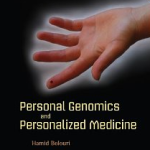
Possibly the Best Book on Personal Genomics and Personalized Medicine
We usually stay away from discussing the hottest topic in biomedical world today, because we are both optimist and pessimist on personalized medicine (explained here and here). Expressing that kind of nuanced view takes far more space than one or two blog commentaries.
Thankfully, we are spared from the herculean task of writing a book, because a far more knowledgeable scientist took on the task and delivered masterfully. Hamid Bolouri’s book titled Personal Genomics and Personalized Medicine (2009) is a must read for anyone interested in learning about the topic. Dr. Bolouri is an expert and believer in genomics revolution, yet he presents his material without hype.

Who is Hamid Bolouri?
Dr. Bolouri pioneered gene network analysis along with professor Eric Davidson and his post-doc Cathy (Chiou-Hwa) Yuh. The Caltech group has always been at least 5-10 years ahead of other researchers working in the same area, and you see reflections of similar forward thinking in Dr. Bolouri’s book on personalized medicine. After Caltech, Dr. Bolouri led the computational team at Leroy Hood’s Institute for Systems Biology. Currently, he works on figuring out gene regulatory interactions in cancer cells at Fred Hutchinson Cancer research center.
Personalized Medicine - Vision for the Future
We know how the pharmaceutical industry works at present. At first, they identify few small organic compounds targeted toward a well-studied disease pathway. Teams of chemists develop other compounds of similar structures, and make tests on model organisms to study their efficacy in curing the disease and potential harmful side effects. If the results of those tests are satisfactory, the drug is clinically tested on human patients leading toward its FDA approval. The entire process from lead generation to final FDA approval is very expensive, and costs around 1 billion dollars for every approved drug.
Does that imply that 1 billion dollars will have to be spent on each drug for each individual in the era of personalized medicine? That is certainly not viable. Dr. Bolouri’s analogy with clothing provides better analogy to how the future is expected to unfold.
Instead of grouping patients in terms of gross symptoms, improved diagnostic technologies allow us to characterize each patients specific condition in terms of particular combinations of dysregulated pathways. Tailored combinations of pathway-specific drugs can then provide highly personalized prescriptions. Viewed in this light, drugs and other medical interventions may be likened to clothing: we all wear some clothing, but we mix and match clothing items to suit our different body types and lifestyles/environments.
What we like about the book
However, reaching that world of tailored medicine is not easy, and Dr. Bolouri’s book explains what the challenges are. Here is what we like about “Personal Genomics and Personalized Medicine” -
1. Reaching the world of personalized medicine from where we are today will not only need scientific breakthroughs, but will also require many radical social transformations. The book covers every aspect of such change including translating scientific discoveries to clinical practices, economic factors, legal challenges and ethical issues.
2. All scientific and non-scientific contents of the book are well researched, well thought-out and incredibly thorough. Even though the author anticipates a revolution in genomic medicine and compares it with revolution in computing that started 30-40 years back, he does not show unbridled enthusiasm and does not try to ‘sell’ his enthusiasm. Rather every opinion in the book is objective, balanced and supported by data.
3. This book will not get obsolete in 2018 even though the topic it covers has been changing very rapidly. Guess what, it came out 4 years back and still feels like it is way into future.
(Note. Dr. Bolouri emailed us with this correction - “You must be thinking of my 2008 GRN modeling modeling book. The Personalized Medicine Book came out at the end of 2010.”)
Who should read
It is recommended for anyone, who wants to understand the ongoing transformation in medicine and participate in it. Chapters 3-5 goes into technical details of genomics that geneticists will gain the most from, but given that the revolution in personalized medicine is based on genome sequences, we do not see another way of presenting the material that avoids gene interactions. The author includes an introductory chapter on gene interactions (chapter 2) to help non-geneticist readers follow the remaining text easily. Bioinformaticians and computational biologists should gain a lot from this book, because the author is a computational biologist himself.
What we do not like
1. Price: Paperback edition of the book sold out and the hard-cover edition is expensive for many of our readers.
2. Availability: We do not know, why the libraries around here did not pick up such an excellent book. We looked around our neighborhood full of universities, but nearest copy we could locate needed a passport and harassment from homeland security.